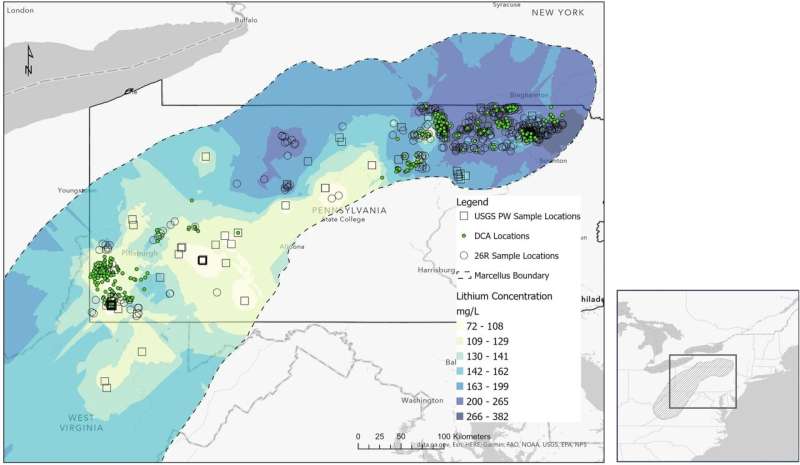This article has been reviewed according to Science X's editorial process and policies. Editors have highlighted the following attributes while ensuring the content's credibility:
fact-checked
peer-reviewed publication
trusted source
proofread
Making batteries takes lots of lithium: Almost half of it could come from Pennsylvania wastewater

Most batteries used in technology like smartwatches and electric cars are made with lithium that travels across the world before even getting to manufacturers. But what if nearly half of the lithium used in the U.S. could come from Pennsylvania wastewater?
A new analysis using compliance data from the Pennsylvania Department of Environmental Protection suggests that if it could be extracted with complete efficiency, lithium from the wastewater of Marcellus shale gas wells could supply up to 40% of the country's demand.
Already, researchers in the lab can extract lithium from water with more than 90% efficiency according to Justin Mackey, a researcher at the National Energy Technology Laboratory, and his Ph.D. advisor Daniel Bain, associate professor of geology and environmental sciences at the University of Pittsburgh's Kenneth P. Dietrich School of Arts and Sciences.
The U.S. Geological Survey lists lithium as a critical mineral (although, as Mackey was quick to point out, lithium is an element, not a mineral). The designation means the U.S. government wants all lithium to be produced domestically by 2030, and so the search for sources has intensified. Currently, much of it is extracted from brine ponds in Chile. Then it's shipped to China, where it's processed.
There are lithium mining operations in the U.S., but Mackey said. "This is different. This is a waste stream, and we're looking at a beneficial use of that waste."
Finding lithium in the wastewater in Marcellus shale wasn't a surprise: Researchers had analyzed the water recycled in hydraulic fracking and knew that it picked up minerals and elements from the shale. "But there hadn't been enough measurements to quantify the resource," Mackey said. We just didn't know how much was in there."
Thanks to Pennsylvania regulatory requirements, the research team was able to figure it out. They published their results in the journal Scientific Reports.
Companies are required to submit analyses of wastewater used in each well pad, and lithium is one of the substances they have to report, Mackey said. "And that's how we were able to conduct this regional analysis."
Meeting 30% to 40% of the country's lithium needs would bring the country much closer to the 2030 requirements. But there's lithium-rich wastewater outside of the state's boundaries, too. "Pennsylvania has the most robust data source for Marcellus shale," Mackey said. "But there's lots of activity in West Virginia, too."
The next step toward making use of this lithium is to understand the environmental impact of extracting it and to implement a pilot facility to develop extraction techniques.
"Wastewater from oil and gas is a burgeoning issue," Mackey said. "Right now, it's just minimally treated and reinjected." But it has to potential to provide a lot of value. After all, he said, "It's been dissolving rocks for hundreds of millions of years—essentially, the water has been mining the subsurface."
More information: Justin Mackey et al, Estimates of lithium mass yields from produced water sourced from the Devonian-aged Marcellus Shale, Scientific Reports (2024). DOI: 10.1038/s41598-024-58887-x


















